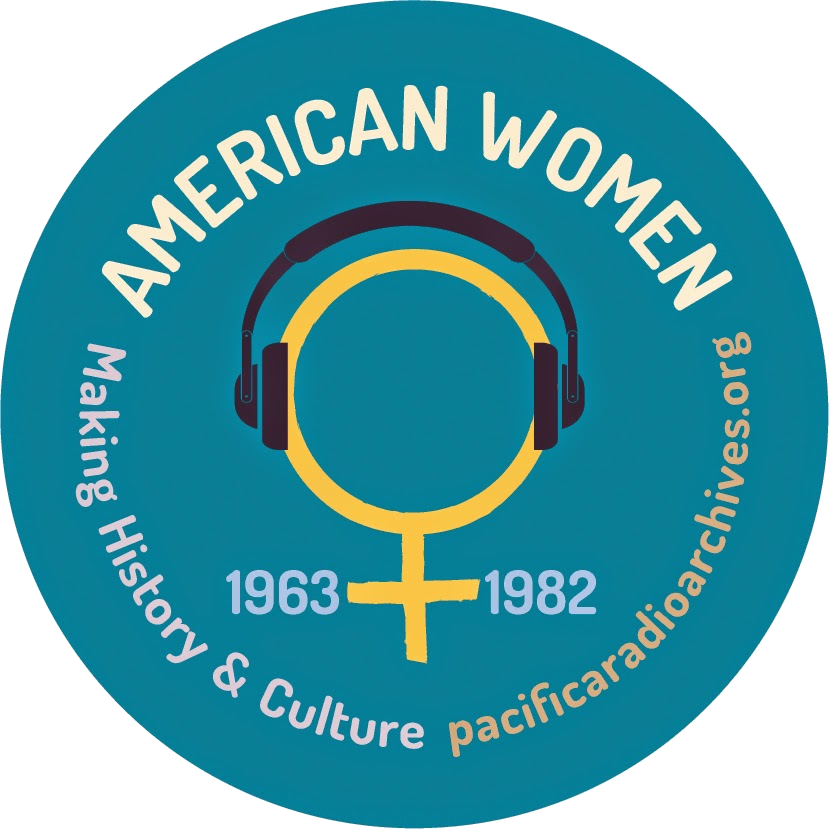About the Project:
The American Women Making History and Culture: 1963-1982 collection includes 2,024 reel-to-reel tapes and 2,024 WAV files preserved as part of the Pacifica Radio Archives' 2013-2016 "American Women Making History and Culture: 1963-1982" ("American Women") preservation project. The recordings were selected as an "artificial collection" to document the Women's movement and second-wave feminism as it was broadcast on the Pacifica network. The collection also includes recordings that, though they weren't about feminism or women's rights, are significant because they were produced by women or featured women important to American history and culture at that time. Nearly all of the recordings were broadcast between 1963 and 1982 on a Pacifica network station: KPFA - 94.1FM Berkeley, CA; KPFK - 90.7FM Los Angeles, CA; WBAI - 99.5FM New York, NY, KPFT - 90.1FM Houston, TX; and WPFW - 89.3FM Washington, D.C. or via satellite. One thousand six hundred and ninety six reel-to-reel tapes were digitized with funding from the National Historical Publications and Records Commission (NHPRC) of the National Archives and Records Administration (NARA), and all 2,024 tapes are being stored at the University of Maryland's Public Broadcasting Archive. The 2,024 WAV audio files are being stored at the Pacifica Radio Archives in North Hollywood, CA, the University of California, Berkeley Library, and the Internet Archive in San Francisco, CA.
Background:
In 1946, Lewis Hill (1919-1957), a pacifist, Quaker, and Washington, D.C. newsman, established the Pacifica Foundation to "...contribute to a lasting understanding between nations and between the individuals of all nations, races, creeds, and colors...[and]promote the full distribution of public information." (Pacifica Foundation Mission Statement, http://www.pacifica.org/about_mission.php) On April 15, 1949, after three years of planning and fundraising, the first Pacifica Station - KPFA FM in Berkeley, CA - went on the air, becoming the first broadcast entity to successfully experiment with listener sponsorship, now the backbone of the public broadcasting system. In 1959, Pacifica expanded to Southern California with KPFK Los Angeles, and in 1960, New York radio station WBAI was donated to Pacifica by owner Louis Schweitzer for broadcast in New York. In 1970 Pacifica's Houston, TX station KPFT began broadcasting, and Pacifica's fifth station, WPFW in Washington, D.C. began broadcasting in 1977. All five stations continue to broadcast under the Pacifica network today.
The Pacifica Radio Archives ("the Archives"), originally known as the Pacifica Tape Library, was established in 1972 to be Pacifica's preservation and distribution arm. The Archives are located in North Hollywood, CA in the KPFK radio building, and are endowed with the mission to appraise, collect, organize, describe and preserve the creative work generated by, or produced in association with Pacifica Radio, and make it available for research, reference, rebroadcast, or re-purposing (as appropriate). The est. 100,000 historically significant reel-to-reel master audio tapes were deposited by Pacifica station and network producers, and individual station program directors. Each program, including those in the American Women collection, was deemed to be of importance, either for historic value, for copying and distribution to Pacifica and other public, community and educational radio stations for broadcast, or because it would be of interest to researchers, documentarians or a significant number of individual listeners. The American Women collection includes the Archives' holdings from Pacifica radio entities pertaining to the Women's movement, or the period popularly known as second-wave feminism in the United States; from the publication of The Feminine Mystique (Betty Friedan, 1963) until Congress failed to pass the Equal Rights Amendment in 1982.
All of the tapes in the American Women collection are recordings of programs broadcast by the Pacifica stations during the collection time span, and accessioned by the Archives for distribution and safekeeping. This collection is but a fraction of the total number of programs created at that time. Many tapes, for reasons of economy, were dubbed over and recycled in order to save on costs of tape stock, and it is unknown how many of these programs are gone for good. We are indeed fortunate that some of this crucial material was saved.
From its beginning in 1949, and through the Women's movement era, Pacifica's noncommercial, listener-supported radio stations opened their microphones to brave new thinkers, the disenfranchised, activists, and creative-types. Pacifica had unique access to groups of people typically under-represented in the public record, and provided a comfortable, salon-type setting where guests felt free to explore new ideas. Pacifica has always been dedicated to airing a spectrum of views, and views there were: conservative, radical, all over the map. KPFA-Berkeley, KPFK-Los Angeles, and WBAI-New York broadcast some of the first programs directly addressing the Women's movement, and there were always key women programmers and staff at Pacifica's oldest station, KPFA-Berkeley. Pacifica Radio and the Archives' collection pre-date National Public Radio by over twenty years, including the years 1963-1971, which were pivotal to the American Women's movement







